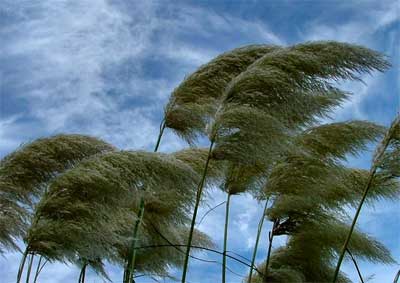
WHAT THE WIND SAYS.
O be still, naughty, troublesome old wind!" cried Nell.
"You blow my curls, and make my eyes weak, and—" "Pump water and grind the corn for my mush, and do a hundred other nice, kind things," interrupted Mr. Blythe, catching the little girl in his arms and pushing back the curls that the wind had stopped to play with.
"Why, papa, is that you?" exclaimed Nell, laughing. "How can you say that the wind does nice, kind things? It always seems to me like a great ugly giant storming through the house, banging doors and shutters. I wish that I could catch it and shut it up for ever."
Papa shook his head.
"Well, but, papa, you cannot say that the wind always does nice, kind things. You know that it sometimes tears trees up by the roots, throws down houses, and frightens people out of their seven senses, almost."
"Very true," said Mr. Blythe.
"Just think," began Nell eagerly—"just think what happened after we had worked so hard, and so much money had been spent to paint our church and buy a new organ and put fresh carpet on the aisles,—how the wind blew the steeple over, so that it came crashing through the roof and spoiled all our work."
"Yes, I remember all about it, little girl. Perhaps it was the best thing that could have happened; it made us give more money than we had thought we could give, just to build it up again, and so, somehow, we got into the way of liking to give; that is a great thing, you know. But, Nell, what do you suppose would happen if you could catch the wind and shut it up, as you say, so that it could never blow again!"
It was Nell's turn to shake her head.
"The windmills would all stop," she said.
"That would be bad news for the farmers in France and Holland," said her father. "They would want to find the little girl who had imprisoned the wind."
"I should just say that they had better contrive something finer than a great awkward windmill," said Nell. "I saw a picture of one the other day,
papa. A gentleman was showing some boys and girls how the arms could be turned by the wind."
"Loss of windmills would not be the worst that could happen, Nell."
But Nell could think of no greater trouble that would come even if she should have her way. It was plain, you see, that she knew very little about the wind. She did promise, though, that if papa would give her a certain new storybook, she would try to find out about the matter. But papa would not be bribed.
"I will not tell you just what would happen," he said, "except that I think you would be glad to set the old giant free, and that you would even beg him to begin his journeys up and down the world again as soon as possible. Now, I do not think of the wind as a great ugly giant; it seems to me more like the voice of a friend whispering pleasant words in my ear. Shall I tell you what it will probably say to me the next time that it comes in at my window'?"
Nell laughed at her father's odd fancy. "What could it say, papa?" she asked wonderingly.
"Many things; among others, that it had just been to carry life and health and freshness into the room of a certain little lady, and that the lady had jumped up with a frown, crying, ' Oh, you ugly, troublesome wind, see how you have scattered my papers, blown down my hat, and rumpled my curls!
I will shut the window and keep you out.'
"By and by the little lady will be warm and sleepy from breathing bad air, and will have a headache, but she will not know the reason.
Foolish child I say!.
But the wind will whisper, Be patient; ‘she will be wiser by and by.'
"Then I shall say, Stay a while, gentle wind, and whisper some more words of faith and patience.' But the wind will answer, I must haste to my work on the sea and land and among the clouds.' With a parting sigh, away it will fly, to fill the sails that are waiting.
"It will play over the land, too, in many a merry breeze, helping in ten thousand ways with the life and growth and gladness of man and beast and flower—always God's messenger, content to do his will, whether it be to make music among the trees, or to carry a breath of comfort to the sick, or to bear the clouds from the sea to water the earth.
"Do you know what I shall say to the wind?
'Good, kind wind, you have shown me a lesson of patience, faith and tenderness! Come back soon, and whisper to me other lessons.'"
"My giant knows how to preach very good sermons," said Nell thoughtfully. "Do you think, papa, that he would ever have anything to say to me?"
"That depends upon whether you want to listen, Nell. People who keep their eyes and ears and hearts open, can generally find—
'Tongues in trees, books in the running brooks, Sermons in stones, and good in everything.'"
—.Meade Middleton.